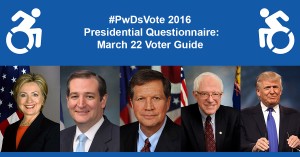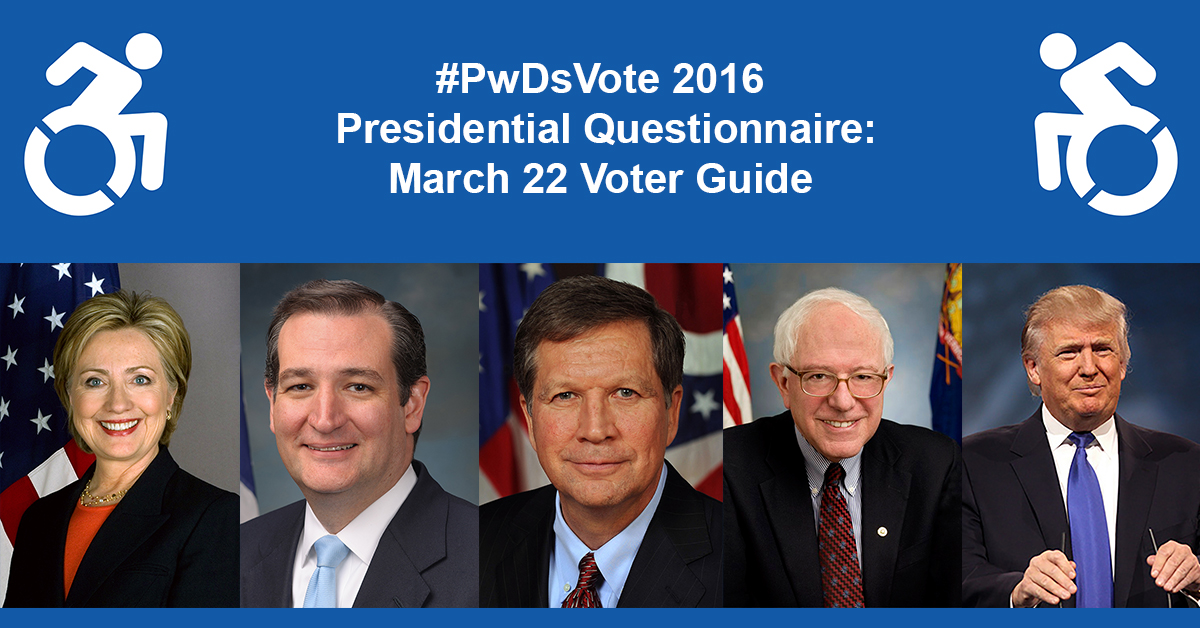 Washington, March 22 – As voters head to the polls in Arizona, Idaho and Utah today, RespectAbility released its March 22nd Disability Voter Guide. The #PwDsVote 2016 Campaign Questionnaire was designed for people with disabilities (PwDs) and those who love them to know where candidates stand on the issues. The questionnaire asked all of the presidential candidates on both sides of the aisle to comment on 16 disability questions. Former Sec. of State Hillary Clinton and Sen. Bernie Sanders responded by addressing all of the questions, and Ohio Gov. John Kasich filled out parts of the questionnaire. They each have significantly different views on the issues. Despite numerous requests in person and by phone and email, the campaigns of Sen. Ted Cruz and Republican frontrunner Donald Trump have not yet filled out the questionnaire.
Washington, March 22 – As voters head to the polls in Arizona, Idaho and Utah today, RespectAbility released its March 22nd Disability Voter Guide. The #PwDsVote 2016 Campaign Questionnaire was designed for people with disabilities (PwDs) and those who love them to know where candidates stand on the issues. The questionnaire asked all of the presidential candidates on both sides of the aisle to comment on 16 disability questions. Former Sec. of State Hillary Clinton and Sen. Bernie Sanders responded by addressing all of the questions, and Ohio Gov. John Kasich filled out parts of the questionnaire. They each have significantly different views on the issues. Despite numerous requests in person and by phone and email, the campaigns of Sen. Ted Cruz and Republican frontrunner Donald Trump have not yet filled out the questionnaire.
RespectAbility is nonpartisan and does not endorse candidates. The questionnaire is purely for educational purposes as voters go to the polls.
Fully one-out-of-five voters have a disability, and 52 percent of likely voters have a loved one with a disability. Only 34 percent of working-age Americans with disabilities have jobs, despite the fact that the vast majority want to work. More than 11 million working age people with disabilities are now living on government benefits in our country.
RespectAbility President Jennifer Laszlo Mizrahi said, “Our community is looking for jobs so we can achieve the American dream, just like anyone else. It is vital for us to know where the candidates stand economic, stigma, education, safety, transportation, housing, healthcare, foreign affairs and other issues. The candidates have hugely different ideas about how to deal with the issues. Thus, it’s extremely important to read their full answers so you can understand their vast differences.”
Just roughly 30 percent of people with disabilities are employed nationally; all three states voting today perform better than the national average. More than 33 percent of Arizona‘s working-age people with disabilities are employed and the same is true for nearly 37 percent in Idaho. People with disabilities in Utah fare even better – 42.5 percent of people with disabilities of working age in Utah are employed. However, the employment gap between people with and without disabilities is still too large, with all three states employing between 71 and 77 percent of people without disabilities. This lack of employment for people with disabilities creates poverty, powerlessness, and poor health. Polls and studies show that people with disabilities want the opportunity to have the dignity and independence that jobs provide.
America has 1.2 million youth with disabilities, between the ages of 16 and 20. Each year 300,000 of them age into what should be the workforce, but stigmas and lack of knowledge about the capabilities of people with disabilities means that most do not find employers willing to hire them. Young adults with disabilities in all of these states are hoping to find work. They have high expectations and deserve the opportunity to achieve the American dream. Young people with disabilities may simply need some thoughtful help to transition into the workforce. See data on all 50 states here: State Data.
RespectAbility says they will continue to urge Cruz and Trump to submit their ideas for the disability community. The questionnaire is being distributed to more than 50,000 people who care about disability issues, more than ten thousand of whom live in the early primary states and the heads of more than 100 national disability organizations, many of whom will share with their own lists. RespectAbility also has placed online ads sharing the questionnaire.








Be First to Comment